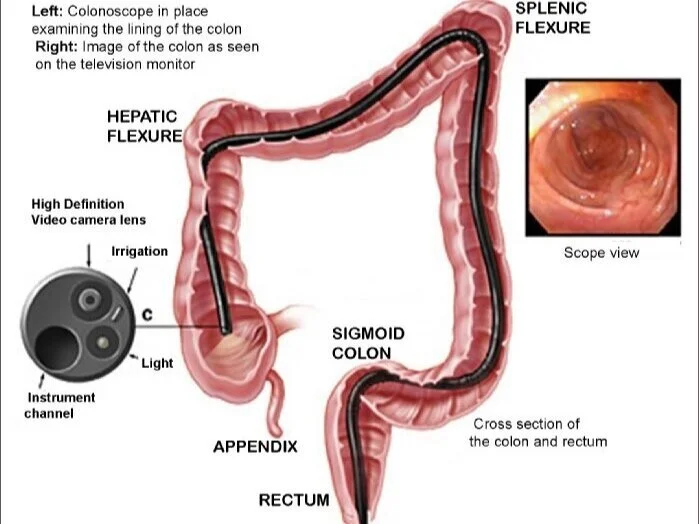Colonoscopy
Diagnostic colonoscopy £1,800
Therapeutic colonoscopy (including polypectomy) £2,400
Combined, diagnostic upper GI endoscopy & colonoscopy £2,500
Fees for self-funding patients include private en-suite room with meal, nursing care on ward, in endoscopy and in theatre recovery area, IV cannulation, endoscopy suite and theatre equipment, sedation and local anaesthetic spray, Moviprep bowel preparation prescription, Dr Maiden’s fee and hospital administration. Concessions with private health insurers.
A colonoscopy is a test, performed with or without sedation, which allows a doctor to look at the lining of the colon (large bowel)
How is it done?
A colonoscope is a long flexible tube with a bright light at the end, which is passed very carefully through the anus so that the doctor can see the lining of the colon. In some cases, biopsies (small pieces of the bowel lining) may be taken with tiny forceps and sent to the laboratory. It may also be necessary to remove polyps (abnormal growths of tissue) during a therapeutic colonoscopy, which your doctor will want examined more closely in the laboratory. Both taking biopsies and the removal of polyps are painless procedures. The test is simple and usually takes between 15 and 30 minutes.
Preparation
To allow a clear view of the colon, it must be completely empty. If it is not certain areas may be obscured and the procedure may have to be repeated. Please read the information you have been given regarding your bowel cleansing preparation and make sure you follow the instructions carefully. Please continue to take essential drugs such as steroids, heart tablets etc. as usual on the day of the procedure.
If you are diabetic or take anticoagulants (e.g. Warfarin) please inform the department when you receive your appointment. If you are taking iron tablets, you must stop taking them for one week before the test. Please bring a complete list of any medication you are currently taking.
What happens ?
When you arrive at the department you will be booked in at reception and accompanied to your room by one of the nursing staff. They will obtain information about previous medical illnesses. You must tell the nurse or doctor if you have any allergies, or have had bad reactions to drugs and/or other tests. They will also want to know about any previous endoscopy you may have had. You will be asked to undress and put on a hospital gown, also to remove any jewellery or metal objects in case special pieces of equipment are used. If you wish, you may bring your own dressing gown and slippers to help you feel more comfortable. The staff want you to be as relaxed as possible for the test, so if you have any worries or questions at this stage, don't be afraid to ask. If you come to the endoscopy unit alone we will need the contact number of the person taking you home.
The test
Before the test Dr Maiden will explain the test and its implications to you again. Once you are happy with this and fully understand what is involved, you will be asked to sign a consent form. You will then be transferred to the endoscopy suite and during the examination you will be made comfortable on a couch, resting on your left side with your knees slightly bent. A nurse will stay with you throughout the procedure. A small needle called a cannula will be inserted into your hand or forearm, this is to enable the doctor to give you a small injection to make sure you are relaxed.
When the tube has been inserted through the anus into the colon, gas will be passed through to distend it and give a clear view of the lining. This may give you some wind-like pains, but these will not last long. You may also get a sensation of wanting to go to the toilet, but as the bowel is empty, there is no danger of this happening. You may pass some wind, but although this may be embarrassing please remember the staff do understand what is causing it. Once the start of the colon is reached the scope is slowly withdrawn back towards the rectum and the colon carefully inspected again and any biopsies taken or polyps removed. The procedure usually takes about 30 minutes.
After the test
You will be moved to the recovery room where a nurse will look after you before you return to your room. Any discomfort from wind will soon settle and no medication is normally needed. If you have had sedation a resposible adult should drive you home and accompany you for at least 12 hours. You should not operate machinery or sign important documents for 24 hours.

